Going in with our eyes open: Matt Ross speaks with Stephen Lovegrove
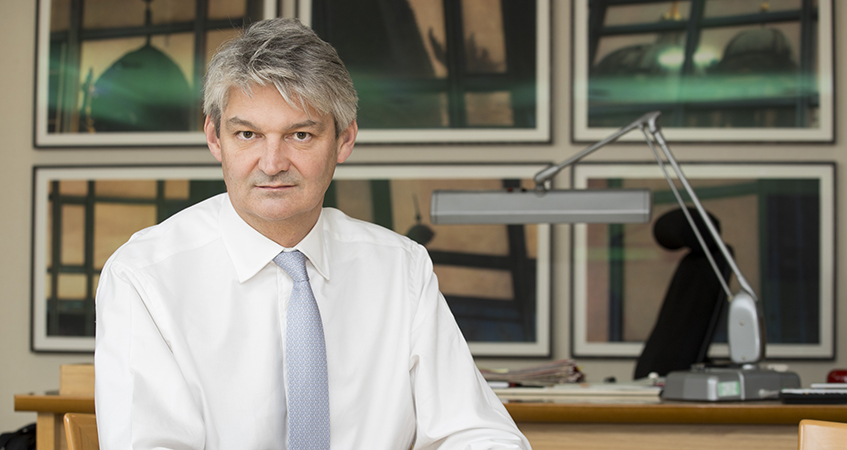
Stephen Lovegrove’s career path makes him a rarity among permanent secretaries: a former consultant and investment banker, he entered the civil service in his late 30s via the Shareholder Executive – which managed government-owned businesses. And his 2013 promotion to Permanent Secretary at the then-Department for Energy and Climate Change was equally unusual: he got the job after PM David Cameron vetoed the recruitment panel’s chosen candidate, economist and climate change expert David Kennedy.
Cameron explained that DECC’s civil service chief, above all, would need “commercial experience and the ability to do deals”; his focus would be delivery, not policymaking. In an interview at the time he took charge, Lovegrove told me he was glad the main planks of DECC policy were already decided: “It means we can concentrate on implementation,” he said.
Five years on – and nearly two years into his stint as Permanent Secretary at the Ministry of Defence – it appears that, as so often in government, things didn’t quite work out as planned. “My assessment that all the policy had been done when I arrived and that it was all about execution was probably a bit optimistic,” he says now with a wry smile. “There was a lot of policy development there, and the Secretary of State changed – so it was not a policy-free zone by any stretch of the imagination!”
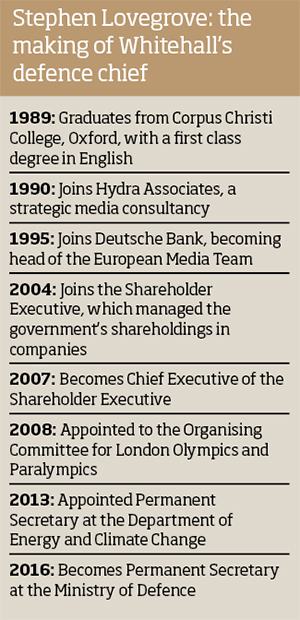
The stakes are, of course, higher still at the MoD, where policymaking has a different slant and several additional layers of complexity. In defence, Lovegrove explains, policymaking focuses on building capabilities to give “the nation the military wherewithal to do what it wants to do.” And the wider policy framework is “very consciously created in conjunction with other parts of government, most notably the National Security Secretariat in the Cabinet Office, the Foreign Office, DfID, the [intelligence] agencies and the Home Office. Our policy role is avowedly pan-governmental.”
After years of growing integration in defence and security policymaking, defence secretary Gavin Williamson’s announcement in January that he’d be rethinking the MoD’s aspects of the National Security Capability Review (NSCR) sparked concerns – with former national security adviser Peter Ricketts tweeting that “separating out Defence from the Nat Sec Review was a step backwards.”
Lovegrove, though, says firmly that “the defence review cannot be separated from a wider national security strategy; that would be crazy, and we would never dream of doing it”. The new Defence Modernisation Programme (DMP), he argues, was required because the NSCR showed that “defence needed to spend some more time thinking through some issues around capability and sustainability which had arisen, peculiarly in the defence area, because of the changes we’ve seen in the last couple of years.”
What Lovegrove is saying – very diplomatically – is that the MoD couldn’t square its budgets, the savings currently falling out of its efficiency programmes, and the military capabilities required of it. The DMP is, he explains, designed to create “a clear-eyed assessment of the threat; a clear-eyed assessment of the capabilities we need to meet that threat; and a clear-eyed assessment of how we need to go about affording them – and if there are difficult choices that need to be made, I’m sure we will make them.”
There is quite a lot of preparatory work to do, Lovegrove adds, “before we get to the stage where we think that the budget and the [required] capabilities are an exact match.” As well as its defence priorities and its efficiency programmes, he says, the MoD must rethink its “operating model” and “make sure that we’re in the best possible and most productive partnership with the industry that supports us.”
This suggests the need for further changes at Defence Equipment and Support, the MoD’s procurement agency, which in 2014 won greater autonomy and the right to sidestep civil service pay controls. But these reforms have already helped curtail the military’s tendency to regularly alter contracts and specifications – producing “tens of millions of pounds of savings through better controls,” says Lovegrove. And DE&S is now “moving on from some of the consultancy relationships, which are quite expensive, and hiring people in so that they’re a durable and enduring resource rather than a bought-in service.”
Using its pay freedoms, he adds, DE&S “has a model where people and teams are genuinely rewarded for hard work; and the corollary of that is that they’re quite brisk about changing things when they need to, in a way that possibly the rest of the civil service finds a bit more difficult”.
So does DE&S’s experience point to the need to pay higher salaries when the civil service must compete with business to hire in specialist skills? “There is a good case, yes,” he replies. “Its wage bill is a tiny fraction of the money that goes through DE&S every year; even a large rise in the wage bill is dwarfed by a small fall in DE&S spending. It’s got to be worthwhile for the taxpayer to do that.”
For many MoD civil servants, though, the prospect is not of pay rises but of seeing their jobs outsourced: in 2015 the government pledged to cut their numbers by 17,000, or 30%. Tasked with saving £310m annually on the civilian paybill by 2020, Lovegrove says that outsourcing is not a “universal panacea”, but argues that “we need to be really thoughtful about which jobs need to be done by defence personnel and where we could get a better service, and possibly provide better careers for people, if jobs were in the private sector”.
To deliver such huge changes, Lovegrove will have to strengthen the ministry’s ability to deliver reform programmes: at 31%, its 2017 Civil Service People Survey score for ‘leadership and managing change’ is some 16 points below the average for all Whitehall departments. Meanwhile its ‘learning and development’ score has sunk from eight points ahead of the average in 2009 to three points behind in 2017 – an embarrassing statistic, given Lovegrove’s role as chair of the Civil Service Learning and Leadership Board.
“It’s one of the areas that people are rightly dissatisfied with,” he concedes. “I think we’ve been guilty of squeezing learning out of people’s work plan. We need to insist that people take time out of their professional lives for it.”
This dynamic has weakened learning for senior officials as well as more junior ones, he believes: “It’s something that we’ve allowed to become less prominent over the years, and we need to start building that up again,” he says. “We need to invest in the leadership skills of our most senior people, and we haven’t done as much of that as we should have”.
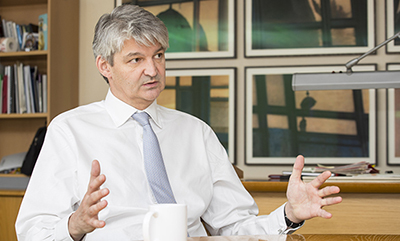
One of the Academy’s work strands focuses on the lessons of Chilcot – and, asked how he hopes such training can help shift the culture of the MoD, Lovegrove replies that “we don’t have a particularly optimised culture for giving challenge. There are moments when it’s really important that ministers and senior officials are exposed to the full range of options.”
He also wants to break down some of the long-standing barriers between the MoD and other departments. The ministry “is part of the civil service; it can’t do its work except in service of other bits of the civil service; it can’t do its work without relying on other bits of the civil service; and it has a lot to learn from other bits of the civil service,” he argues. “So I don’t see that there is any downside to trying to make the MoD more open.”
The ministry has much to teach as well as to learn, he adds, citing its skills in emergency management, planning, export promotion and international engagement. “So it’s a two-way street – but I do think that the very distinctive culture of defence could open itself up a bit more to influences, not just from Whitehall but actually to wider society as well,” he says. “We want to lower the drawbridge a bit.”
The MoD will, however, always retain a unique world view – for it has a unique job to do. And like his predecessor, Jon Thompson, Lovegrove has clearly immersed himself in the ministry’s culture. On his office walls a pop-art Tiger tank seems to burst out of its picture frame, whilst his bookcase carries a roll of toilet paper printed with Vladimir Putin’s face. “A present from Ukraine,” he comments, deadpan.
As Lovegrove gets stuck into the Defence Modernisation Programme, working to balance the government’s vaunting military ambitions with the Treasury’s tight grip on the purse strings, he’ll need to call on all the commitment, loyalty and expertise of his civilian and military staff. He will also need political cover from his Defence Secretary – and here, perhaps, his hand may be strengthened by Gavin Williamson’s ambitions and connections.
So one last question: might the MoD’s bid for a sustainable budget be aided by the fact that the Defence Secretary is on a set of manoeuvres of his own? Lovegrove does not, of course, answer directly. “The Secretary of State is very clear that defence in the UK needs to be prioritised and modernised,” he replies. “Defence is not something we can take for granted. The first duty of any government is to keep its citizens safe, and a lot of the responsibility for that falls to defence. There are threats in the world, and defence is here to try and make sure that we can deal with them – so I think a higher profile national debate about this is no bad thing.” I think that’s a ‘yes’.
Related News
-
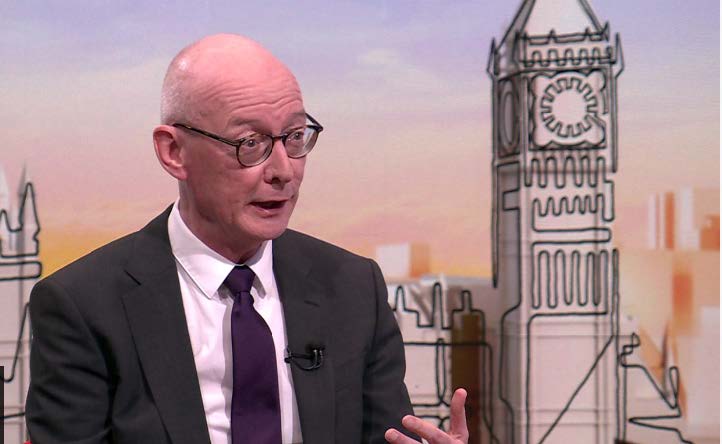
Meaningful reform
It’s time to lead the civil service, not just the morning news round, says Dave Penman.
-
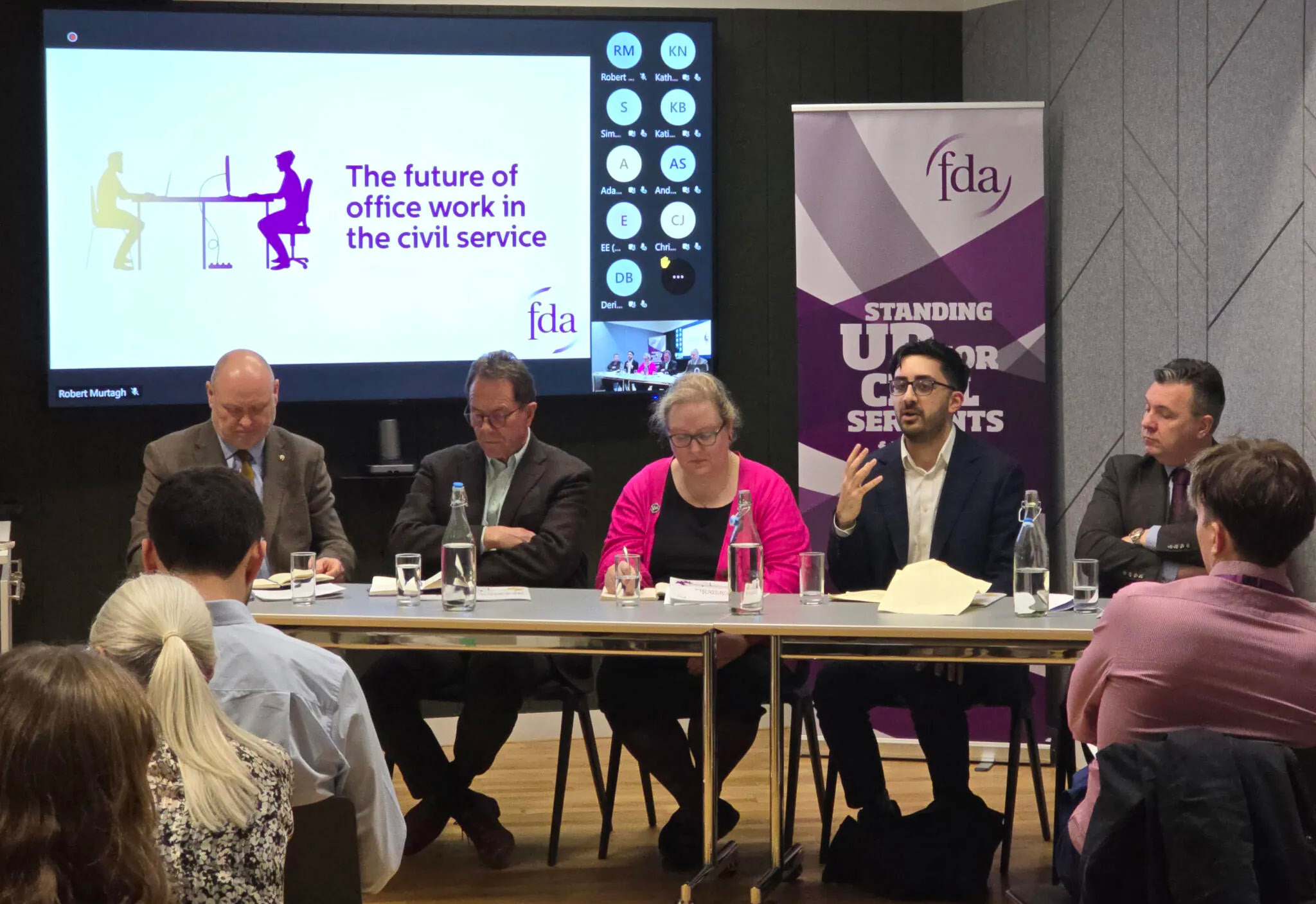
Hybrid working: Led by evidence, not headlines
Tom Nathan shares the findings and recommendations of the FDA’s recent report on ‘The future of office working in the civil service’.
-

FDA attends TUC Young Workers’ 2025
This March, an FDA delegation attended the annual TUC Young Workers’ Conference in Congress House, London.